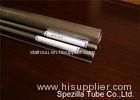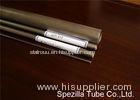Commercially Welding Titanium Tubing ASTM B862 Grade 2 UNS R50400
Description:
Titanium has four outstanding characteristics:
Corrosion resistance, especially in oxidising conditions (used in chemical process equipment, heat exchangers)
Titanium and its alloys are resistant to aggressive corrodents such as:
Seawater and other chloride salt solutions
Hypochlorites and wet chlorine
Nitric acid, including fuming acids
Erosion resistance (used in heat exchangers)
Superior resistance to erosion, cavitation or impingement attack make titanium attractive for pumps, piping and high velocity heat exchangers.
Strength to weight ratio
The material is intermediate between steels and aluminium alloys, hence many of the initial applications of
titanium alloys in aerospace (used in airframes, landing gear, engine parts)
Elevated temperature performance
Most titanium alloys are satisfactory for continuous service up to 420o C, and some can be used up to 540o C, well above the limit of 120o C for light metals (used in engine parts, chemical processing equipment, heat exchangers)
The excellent corrosion resistance of titanium is due to a thin, stable, protective, highly adherent surface film which forms instantly when a fresh surface is exposed to air and moisture. The strong affinity of titanium for oxygen causes any damage to the film to heal almost instantly, if a trace of moisture or oxygen is present.
Titanium’s density is about 55% that of steel, and alloys can be aged to strengths close to high strength steel. Titanium alloys are used extensively in highly loaded structures in aerospace applications. The corrosion resistance of titanium is based on the formation of a tight stable oxide layer on the surface that prevents the corrosive media attacking the base metal.
Grade 2 (UNS R50400) is commercially pure titanium: it is used for corrosion resistance in the chemical and marine industries, and where ease of forming is needed. Weldability is good.
Grade 7 (UNS R52400) is commercially pure titanium with a small addition of palladium for improved corrosion resistance. It is similar to grade 2, with improved performance in hydrochloric, phosphoric and sulphuric acids. It is used in the chemical industry where media are mildly reducing or vary between oxidising and reducing.
Grade 12 (UNS R53400) is commercially pure titanium with added molybdenum (0.3%) and nickel (0.8%). It is used in the chemical industry where media are mildly reducing or vary between oxidising and reducing. This alloy is particularly resistant to crevice corrosion in hot brines.
Grade 5 (UNS R56400) is the most widely used titanium alloy. It has useful creep resistance up to 300o
C and excellent fatigue strength, with fair weldability. It is used for aircraft gas turbine disks and blades, airframe components, prosthetic implants and chemical processing plant.
ASTM B861 B862 Chemical Requirements
|
Element (max) Grade |
Gr.1 | Gr.2 | Gr.7 | Gr.9 | Gr.11 | Gr.12 |
| N | 0.03 | 0.03 | 0.03 | 0.03 | 0.03 | 0.03 |
| C | 0.08 | 0.08 | 0.08 | 0.08 | 0.08 | 0.08 |








